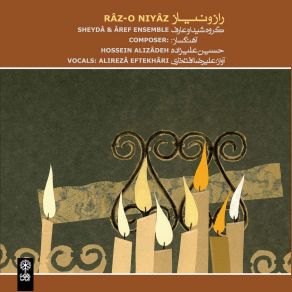Raz–o Niyaz / Raz-o Niyaz
Download links and information about Raz–o Niyaz / Raz-o Niyaz by Hossein Alizâdeh / Hossein Alizadeh. This album was released in 1988 and it belongs to World Music genres. It contains 13 tracks with total duration of 55:43 minutes.

|
|
|---|---|
| Artist: | Hossein Alizâdeh / Hossein Alizadeh |
| Release date: | 1988 |
| Genre: | World Music |
| Tracks: | 13 |
| Duration: | 55:43 |
| Buy it NOW at: | |
| Buy on iTunes $9.99 | |
Tracks
[Edit]| No. | Title | Length |
|---|---|---|
| 1. | Chaharmezrab (feat. Âref Ensemble & Sheydâ) | 3:51 |
| 2. | Daramad (feat. Âref Ensemble, Sheydâ & Alireza Eftekhari) | 5:46 |
| 3. | Sama–e Aseman (feat. Sheydâ, Alireza Eftekhari & Âref Ensemble) | 7:19 |
| 4. | Oshaq (feat. Sheydâ, Alireza Eftekhari & Âref Ensemble) | 2:59 |
| 5. | Forud (feat. Sheydâ, Alireza Eftekhari & Âref Ensemble) | 2:23 |
| 6. | Ahu–ye Vahshi (Tasnif) [feat. Sheydâ, Alireza Eftekhari & Âref Ensemble] | 6:36 |
| 7. | Raz–o Niyaz (feat. Sheydâ & Âref Ensemble) | 5:30 |
| 8. | Shushtari (feat. Alireza Eftekhari) | 2:50 |
| 9. | Bakhtiyari (feat. Alireza Eftekhari) | 4:38 |
| 10. | Masnavi (feat. Sheydâ & Âref Ensemble) | 3:46 |
| 11. | Bayat–e Raje (feat. Masoud Shoari) | 1:38 |
| 12. | Chaharmezrab, Forud (feat. Masoud Shoari) | 2:40 |
| 13. | Biya Ta Gol Barafshanim (Tasnif) [feat. Sheydâ, Alireza Eftekhari & Âref Ensemble] | 5:47 |
Details
[Edit]Raz-o-Niaz is a large-scale work for singer and Persian orchestra divided into two major parts, each of which is divided into a half-dozen smaller sections. The Avaz, or singer, is Ali Reza Eftekhari, whose husky, low tenor voice is rich with feeling. The 14-piece orchestra, the Shayda & Aref Ensemble, is directed by the composer, Hossein Alizadeh, who also plays the tar and setar (Middle Eastern lutes). Interestingly, four of the musicians are not ethnic Persians but Iranian Kurds from the Kâmkârs family ensemble. The liner notes explain the significance of the different sections of music fairly well and the nature of the instruments very well. Each of the major parts starts with an orchestral prelude after which the singer makes his entrance. Alizadeh observes the traditional rules of Middle Eastern composition whereby there is no harmony or counterpoint, but he stretches those rules to allow pedal notes, variations on melodies, and elaborate ornamentation. So the music may be monophonic, but it's never monotonous. Stand-out sections include the first orchestral prelude, which has an almost jazzy rhythm and development, and the second vocal section entitled "Song of Heavens," which has an air of muscular joy, very straight-ahead with no compromises. Eftekhari sounds a bit like José Carreras here. Something of the same air is found in the concluding section, a song entitled "Let's Rejoice," wherein the singer hits even greater emotional highs through anthemic refrains. There are also instrumentals to behold, such as the kamancheh trio of section five and the title section, wherein the setar does a passable imitation of an electric guitar. Raz-o-Niaz is a very approachable work of Persian music and can be safely recommended to those who are new to the genre. To those who are accustomed to music of the region, Raz-o-Niaz will be an album of pure delight.